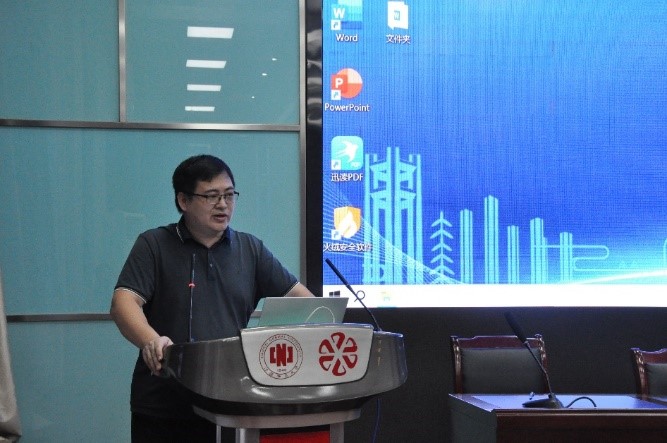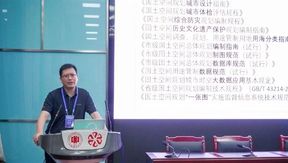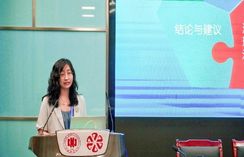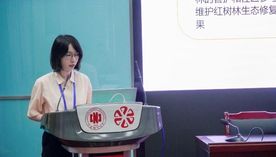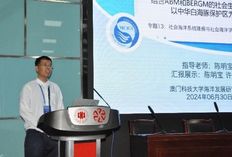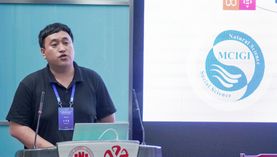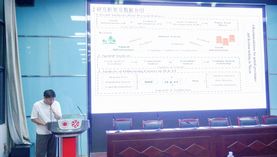社会海洋系统建模与社会海洋学跨学科研究方法创新研讨会顺利召开
为落实联合国海洋科学促进可持续发展十年(2021-2030年)倡议,产生新的海洋科学知识,提供创新的科学解决方案,促进人类与海洋关系的转变,并推动海洋自然科学与社会科学的跨学科理论创新和实践发展,探讨社会海洋系统的建模方法和社会海洋学跨学科研究路径,2024年6月28-30日,经IMBeR(海洋生物圈整合研究国际研究计划)授权,由澳门科技大学主办的“社会海洋系统建模与社会海洋学跨学科方法创新研讨会”在江西省南昌市顺利召开。来自澳门科技大学、中山大学、中国海洋大学、广东海洋大学、自然资源部南海发展研究院等10多家单位的30余位学术界代表共同参加论坛。论坛由澳门科技大学海洋发展研究中心陈明宝研究员和中山大学吴加学教授共同主持,澳门科技大学可持续发展研究所所长刘成昆教授出席会议并致辞。
刘成昆教授在致辞中指出,在联合国“海洋十年”框架下,研究海洋系统与社会系统的相互作用与耦合关系,创新学科范式,得到了学术界广泛的关注。澳门科技大学海洋保护与综合治理交叉学科研究团队致力于人类社会与海洋互动发展、海洋资源与环境可持续发展、海洋生态环境治理等领域的研究,围绕社会海洋系统和社会海洋学的关键问题开展跨学科前沿研究。本次研讨会的召开将为推动社会海洋学范式发展与研究方法创新提供新的契机。

会议合影
吴加学教授在专题报告中以大湾区四种典型海岸为例,说明海岸带是一个复杂的流域-河流-河口-陆架-大洋-大气联通系统,受多界面、跨圈层、多尺度的过程和多重应力所调制,存在复杂的物理-生物-化学-人类活动耦合与分异过程。海岸带的发展变化不仅受海洋、陆地、大气等自然环境的综合影响,而且受到人类活动的直接影响,对海岸带生态系统健康及其可持续发展构成日趋严重的胁迫。因此,必须开展海洋自然科学与社会科学的跨学科研究,促进对社会海洋系统互动反馈机制的理解。
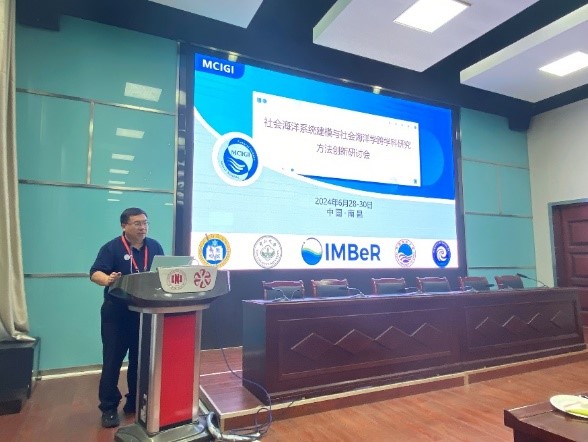 |
|
| 吴加学教授作报告 | 陈明宝教授作报告 |
陈明宝研究员在专题报告中以社会海洋学的新兴领域为切入点,提出了社会海洋系统(如海洋保护区、海洋空间规划、海洋生态系统服务等)中韧性、转型、生态系统服务、稳态转换、公平、适应性治理等6大主题与联合国“海洋十年”10大挑战和棘手问题的对应关系,描述了人类社会与海洋系统之间的复杂交织、代谢过程与共同涌现的社会海洋模式、结构和动态,并指出在社会海洋系统建模过程中,有必要将复杂科学与计算社会科学结合,融入海洋生态学、地理学、保护科学、RS\GIS等自然科学的知识,构建基于人类行为与海洋生态环境过程的相互作用与互馈影响的社会海洋学新研究范式。陈明宝研究员团队随后展示了中华白海豚保护区基于主体(ABM)与系统动力(SD)模型在多层次贝叶斯指数随机图模型(BERGM)中相结合的研究案例,为进一步加强社会海洋学跨学科方法创新提供借鉴。
围绕社会海洋系统建模与社会海洋学跨学科研究方法领域的重大理论与现实问题,与会其他代表分别就蓝碳与海洋空间规划、贝藻养殖碳汇能力与价值评估、海洋城市社会-生态基础设施空间分异、环渤海地区可持续发展评价、蓝色公平下的社会-生态匹配、海岸带城市社会-生态系统韧性等内容进行了学术汇报与交流讨论。
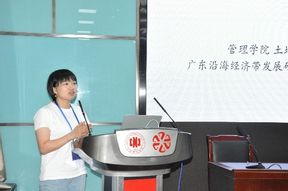 | 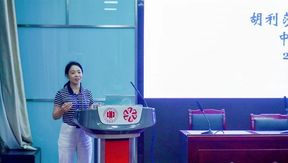 |
| 广东海洋大学 李生辉 | 中国海洋大学 胡利莎 |
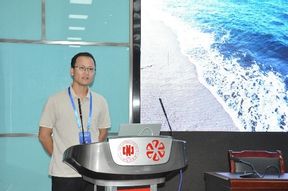 |
|
| 厦门海域海岛技术中心 周培 | 自然资源部南海研究院 张晓浩 |
|
|
| 河北农业大学 闫金玲 | 自然资源部南海研究院 钟卓君 |
|
|
| 澳门科技大学 许志斌 | 澳门科技大学 王宇豪 |
| 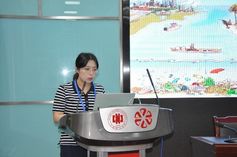 |
| 澳门科技大学 李茂林 | 澳门科技大学 王文慧 |
本次论坛为从事社会海洋系统建模与社会海洋学跨学科研究的专家学者搭建了一个良好的交流平台,有助于社会海洋学学科建设与科学研究的学术交流、思想碰撞,提出新思想、新见解,增进新认识,促进社会海洋学学科建设与科学研究,并推动海洋自然科学与社会科学跨学科领域的高级人才培养。
The "Workshop on Social Ocean Systems Modelling and Innovation of Transdisciplinary Research Methods in Socio-Oceanography", hosted by the Macau University of Science and Technology (MUST) under the endorsement of IMBeR (Integrated Marine BiosphereResearch), was successfully held in Nanchang, Jiangxi Province, China, from June 28-30,2024. The workshop aimed to generate novel scientific knowledge, provide innovative scientific solutions, promote transdisciplinary research by mobilizing natural and social science approaches to transform our understanding of the relationship between humans and oceans, and implement theinitiatives of the United Nations Decade of Ocean Science for Sustainable Development (2021-2030).
Professor Mingbao Chen from the Macao University of Science and Technology and Professor Jiaxue Wu from Sun Yat-sen University chaired the workshop. More than 30 academic representatives from over ten institutions, including Macao University of Science and Technology, Sun Yat-sen University, Ocean University of China, Guangdong Ocean University, and the South China Sea Development Research Institute of the Ministry of Natural Resources, participated in the workshop.
Professor Chengkun Liu, Director of the Institute for Sustainable Development of MUST, emphasized that under the framework of the Ocean Decade, the study of the interaction and coupling relationship between ocean and social systems, as well as the innovation of disciplinary paradigms, has gained wide attention from the academic community. The Marine Conservation and Integrated Governance Interdisciplinary (MCIGI) team from MUST is dedicated to investigating the interactive development of human society and the oceans, the sustainable development of marine resources and environment, and marine ecosystem governance. The team engages in transdisciplinary frontier research on key issues related to the social ocean systems and socio-oceanography. This workshop provided a valuable opportunity to promote the development of the paradigm of socio-oceanography and innovation in research methods.
Professor Jiaxue Wu took four typical coasts of the Guangdong-Hong Kong-Macao Greater Bay Area to illustrate that coastal zones are complex and connected watershed-river-estuary-shelf-oceanic-atmospheric systems modulated by multi-facets, cross-circle, multi-scale processes operating in time and space domains, and multiple stresses. The coastal zone is characterized by complex physical-biological-chemical-human activities coupling and differentiation processes. The coastal zones are changing due to natural processes occurring on land, in the atmosphere, and in oceans, as well as human activities, whose manifestations occur synergistically or antagonistically. Such changes often threaten ecosystem health and the sustainable exploitation of living and nonliving marine resources. He stressed the importance of conducting novel transdisciplinary research in marine natural and social science disciplines to enhance comprehension of the interactive feedback mechanisms of social ocean systems.
Professor Mingbao Chen proposed six themes of resilience, transformation, ecosystem services, homeostatic transition, equity, and adaptive governance (e.g., marine protected areas, marine spatial planning, and marine ecosystem services), which correspond to theten challenges and thorny issues of the Ocean Decade. This correspondence describes the complex intertwining processes between human society and ocean systems emerging from newsocial-oceanrelations, structures, and dynamics. It is essential to integrate complex science and computational social science in the modelling of social ocean systems, which requires integrating the knowledge of natural sciencesand social sciences, such as geography, conservation science,human behaviour, RS/GIS, etc., to build a new research paradigm of socio-oceanography. The research team led by Mingbao Chen then demonstrated the integration of Agent-based modelling (ABM) and system dynamics (SD) models within a multilevel Bayesian Exponential Random Graph Model (BERGM) within the Chinese White Dolphin Nature Reserve. This exemplary research output provides a reference point for further strengthening the innovation of transdisciplinary methods in socio-oceanography.
Other participants presented case studies of novel socio-oceanographic research activities at the workshop, such as Blue Carbon and Marine Spatial Planning, Carbon Sink Capacity and Value Assessment of Shellfish Aquaculture, Spatial Divergence of Socio-Ecological Infrastructures, Evaluation of Sustainable Development of Bohai Rim, Socio-Ecological fit under Blue Equity, and Socio-ecosystem Resilience of Coastal Zoned Cities.
This workshop provided a valuable opportunity to promote the development of the paradigm of socio-oceanography. It forged a novel platform for scholars and practitioners engaged in the social ocean system modelling and governance activities. Sharing various case studies contributed to further enriching and developing socio-oceanography disciplines, which, in turn, enhanced new understandings andcultivated high-level talents in transdisciplinary marine natural sciences and social sciences.
供稿|陈明宝
编辑| IMBeR IPO
排版|刘嘉美


